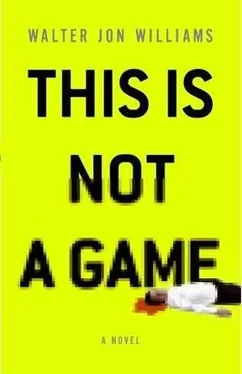Dagmar put the flow chart down in front of the hostess.
“I left off a few unlikely situations,” she said, “like Does customer have a gun? which would lead to a box that says Give him money, but I figure in that situation the customer will tell you what to do. But in the meantime, all you have to do is follow these simple instructions, and you’ll do fine.”
The hostess didn’t say thank you, but then Dagmar hadn’t thought she would.
Dagmar returned to her seat and opened the menu. Burger Angeleno was an upscale diner, the kind of place that served you grass-fed bison patties on your burger, offered the option of soy milk in your shakes, and assured you that the chicken nuggets were free-range and had never been within pecking distance of an antibiotic.
“What’s new?” Austin said.
“We launched the new game yesterday,” Dagmar said. “The site had nearly a hundred fifty thousand hits as of noon today, so I’d say we’re in business.”
“Someday,” Austin said, “I hope to have enough time to actually play one of these games.”
“So do I,” said Dagmar.
They looked up as a man approached. He was about twenty, with a spotty complexion. His slim body was neatly encased in a dark suit. He wore a single earring.
“Excuse me,” he said. “I’m the manager. I understand there’s a problem here?”
“I could use a new place mat,” said Dagmar.
“Donna,” said the manager, “said that you have a gun.”
“Donna,” said Dagmar, “is too stupid to know what the fuck I said.”
A few minutes later, as they drove away in Austin’s car, Dagmar rolled down the window and threw a finger at the receding restaurant.
“I’ve never been thrown out of a restaurant before,” Austin said. “And I liked that place.”
“Plenty of places to get soy milk shakes in L.A. ”
He looked at her from beneath the brim of his Yankees cap.
“Sometimes I worry about you,” he said. “Do you think you might be suffering from post-traumatic stress disorder?”
Dagmar thought about it, then shrugged.
“Who isn’t?” she said.

Austin was a Type One Geek, which is to say he was well over six feet tall and very thin. Because he was now rich, he wore Armani sportswear and custom Ray-Bans and drove a 1957 Corvette, but to Dagmar’s mind he still looked like a Type One Geek, only playing dress-up.
Not that she didn’t love him, of course.
And at least he wasn’t shaving his head, even if he was going bald. You could forgive a rich man a lot for not shaving his head.
And clean on the other end of the scale, he didn’t wear a motoring cap. Points for that, too.
Austin had become a legend in the local world of venture capital because he only had a 63 percent failure rate. Normally 80 percent of start-ups failed, but the 20 percent that succeeded made so much money that they paid for the failures and then some. Austin had somehow made a success of another 17 percent, nearly doubling his company’s income.
Dagmar was really very proud of him.
They found a New Mexican place that had walls covered with embroidered sombreros and black velvet paintings of bullfighters, and Dagmar ordered chiles rellenos, with a sauce made from Hatch green chile.
In Los Angeles, she had observed, menus often told you where the food came from.
“Did I ever tell you about the live event we did in Charleston for Shadow Pattern?” she said. “I asked the hotel concierge where I could find a restaurant with good southern cooking, and he recommended a place. So I went in, and I looked at the menu and saw, ‘Roast breast of upland Carolina quail on a bed of beef tongue tar-tare, garnished with generous slices of foie gras.’ ”
“Did you order it?”
“How could I not?” She laughed. “So that was my experience of down-home southern cooking.”
“Someday I’ll buy you a pork chop and a box of instant grits.”
Austin reached into his canvas shoulder bag and retrieved a package done up in fancy wrapping paper, with a large golden ribbon.
“I bought you a present,” he said.
Dagmar took it with pleasure. She tore away the wrapping and found a book bound beautifully in rich brown calfskin. The paper was edged in gold, and a pair of red satin ribbons, to mark her place, had been bound into the book. She looked at the spine.
The Unconventional Adventures of Dagmar, she read.
“It’s the fan fiction they wrote about you on Our Reality Network,” Austin said.
“Oh my God!” said Dagmar.
“Have you read any of it?”
“No!” she said.
He plucked the volume from her fingers and opened to where one of the red ribbons marked a place.
“I’ve marked my favorite passages,” he said. He propped the book up before him and began to read. “Ahmed ran his fingers through Dagmar’s strangely attractive pale hair.
“ ‘Ahmed,’ she whimpered, ‘I only feel safe when I’m in your arms.’ ”
“Oh God,” Dagmar moaned.
“His powerful arms encircled her from behind. Dagmar shivered as his lips brushed the sensitive skin of her shoulders. His hands rose to palpate her tingling breasts.”
“Saved!” Dagmar said as their meal arrived.
“The plates are very hot,” the waitress said.
“So’s the prose,” said Austin. “Are there really Indonesians named Ahmed? ”
“Probably. I never met any. Or had anyone named Ahmed palpate my breasts, for that matter.”
She tasted one of her rellenos and smiled. Whatever it was that Hatch did to its chiles, she approved. The taste was a far cry from what Cleveland thought of as southwestern cuisine, chili con carne drenched in cinnamon and served on a plate of spaghetti.
Austin was still looking at the book.
“There’s an explicit sex scene that follows,” he said. “Written, I suspect, by someone who has never actually had sex-the anatomy seems wrong here and there-but she’s read about it with great interest.”
Dagmar kept her attention on her plate. “Why do I think,” she said, “that a thousand years from now, the only thing about me that will survive, in some database somewhere, is this fanfic? ”
“Once the other players found out the sort of thing Simone was writing,” Austin continued, “they began to write parodies. They’re pretty merciless, actually.”
“I’m not surprised.”
“I noticed Simone stopped posting after a while.” Austin turned to his other bookmark. “My favorite is a lesbian scene. Let me just give you the flavor of it.”
She snatched the book from his hand and put it on the bench seat beside her. He sighed.
“I hope the people in Bayangan Prajurit never see any of this,” Dagmar said.
“How are they, by the way? ”
“Doing very well. They sent photos of the sidewalks they’d paved.”
Paved with Charlie’s money. Six days after Dagmar’s escape from Jakarta, the IMF and World Bank had made it clear that Indonesia’s fiscal rescue would depend on a civilian government’s remaining in place, so the soldiers had gone back to their barracks, and certain generals had flown to other countries, along with suitcases of money.
In the five months since Jakarta had reopened, Charlie and Dagmar had adopted the Bayangan Prajurit school and its kampung. The local grammar school now had new computers and high-speed wireless Internet, and a local clinic had received additional funding. Areas were being paved, and old homes rebuilt. Microloans were being granted to start local businesses. Charlie provided most of the money, with Dagmar as the liaison.
Bayangan Prajurit had helped Dagmar for their own religious reasons, but Charlie and Dagmar wanted them to enjoy their heightened spirituality from a position of material comfort.
Читать дальше












